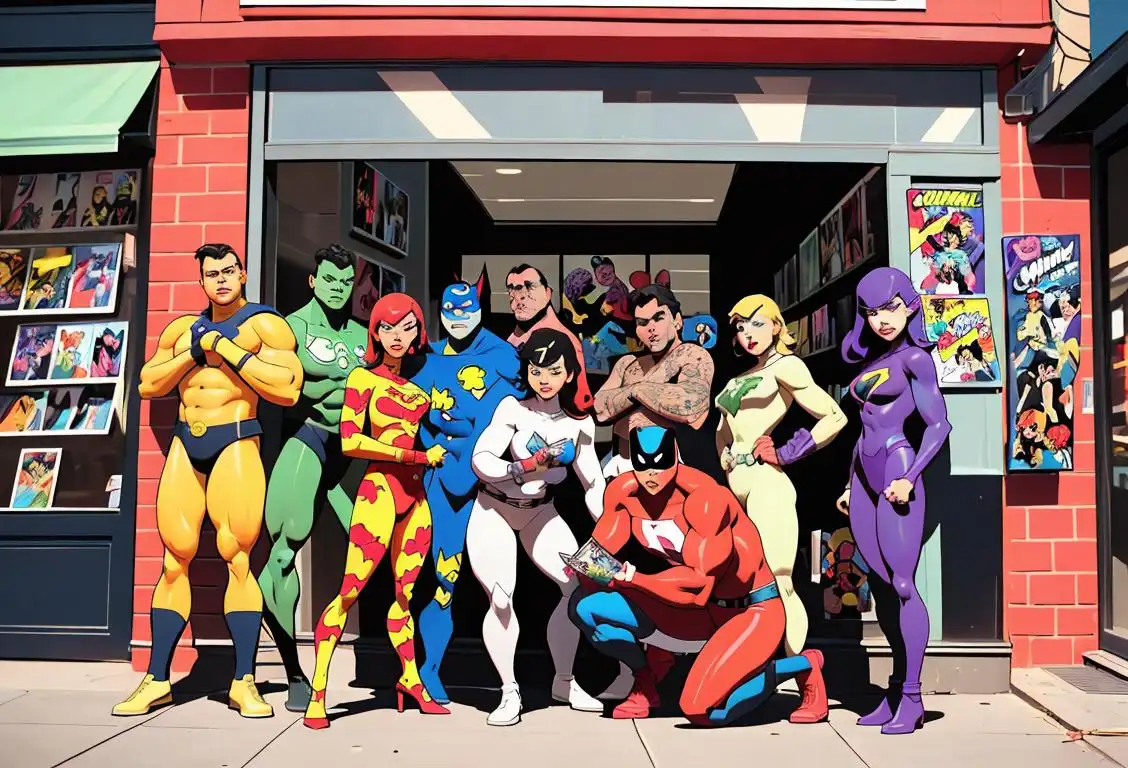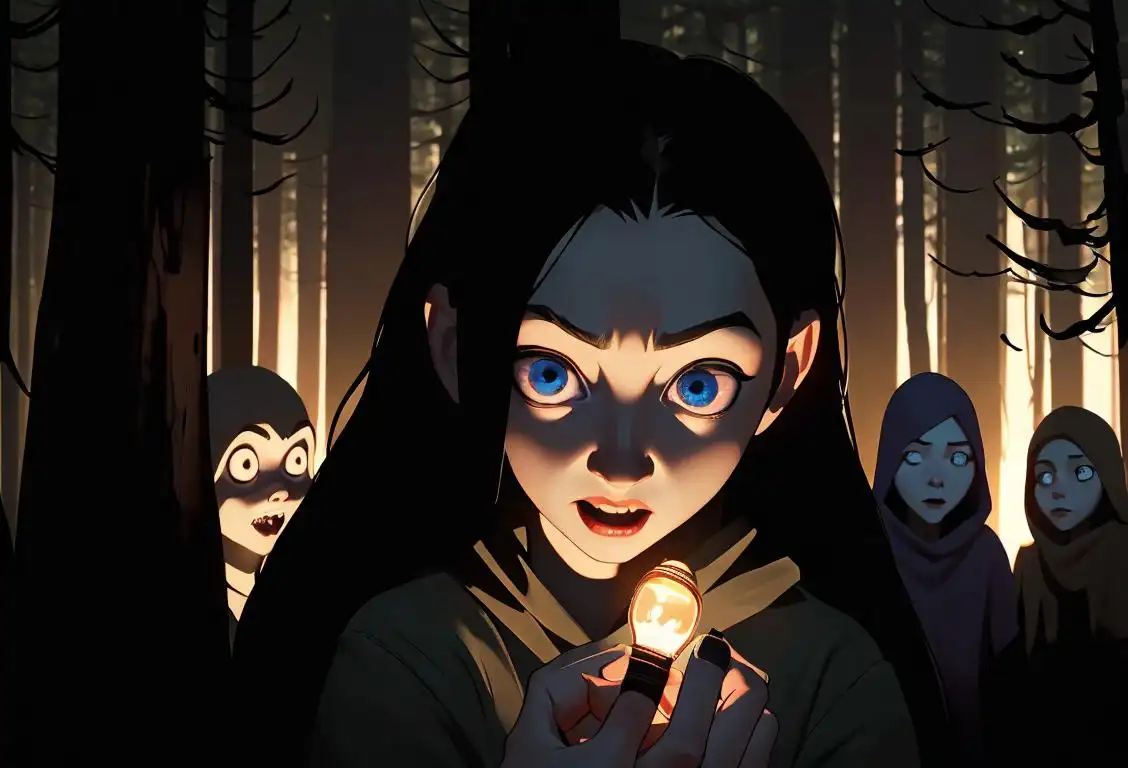National Comicbook Day

Hold on to your capes, it's National Comic Book Day! Get ready to dive into the colorful world of superheroes, villains, and epic adventures. Whether you're a die-hard fan or just dipping your toes into the ink-filled waters, this is the perfect day to celebrate the art form that has captivated readers for decades.
When is Comicbook Day?
It's national comicbook day on the 25th September.
The Origins of National Comic Book Day
Every year on September 25th, comic book lovers unite to honor the incredible world of sequential art. But how did this fantastical day come to be? Well, like any good superhero origin story, it all started on the internet.
Back in 2019, a group of dedicated comic book enthusiasts noticed that there was no specific day to celebrate their beloved medium. So, they took matters into their own hands and created National Comic Book Day. Their mission? To spread the love for comics far and wide, and to remind the world of the incredible power of storytelling through art.
Since then, National Comic Book Day has gained a massive following, with fans and creators alike joining forces to commemorate the impact this medium has had on popular culture.
How to Celebrate
Ready to embrace your inner superhero? Here are a few ways you can celebrate National Comic Book Day:
- 1. Dive Into a Series: Grab your cape and mask and immerse yourself in the pages of a comic series. Whether you prefer the classic tales of Marvel or the dark and brooding world of DC, there's a comic book for every taste.
- 2. Support Local Comic Shops: Show some love to your local comic book store by picking up some new issues or graphic novels. These shops are the lifeblood of the industry, and your support helps keep the adventures alive.
- 3. Cosplay Extravaganza: Put together an epic costume and join in on the cosplay fun. Whether you choose to dress up as your favorite hero or embrace your villainous side, let your imagination run wild.
Did You Know?
Did you know that the first-ever comic book was published way back in 1933? 'Famous Funnies' paved the way for the countless superheroes and stories we know today. Talk about a groundbreaking moment!
History behind the term 'Comicbook'
1837
The Birth of the Comic Strip
The term 'comicbook' traces its roots back to the early 19th century when the comic strip emerged as a popular form of entertainment. In 1837, a French artist named Rodolphe Töpffer published a collection of illustrated stories titled 'Histoire de M. Vieux Bois' (The Adventures of Obadiah Oldbuck). This work is considered the first-ever comic strip, featuring panels with accompanying text. It served as the precursor to the modern comicbook by introducing sequential storytelling through illustrations and dialogue.
1896
The First Comic Book Publication
The year 1896 marked a significant milestone in the development of comicbooks. It was during this year that the first known comic book publication, 'The Yellow Kid in McFadden's Flats,' was released. Created by Richard F. Outcault, this comic strip appeared in Joseph Pulitzer's 'New York World' newspaper. The Yellow Kid gained immense popularity and eventually led to the creation of 'The Yellow Kid' comic book series, making it one of the earliest examples of a comicbook format being used to publish sequential narratives.
1933
The Birth of Famous Funnies
In 1933, a milestone event in the history of comicbooks occurred with the release of 'Famous Funnies' by Eastern Color Printing Company. It is widely regarded as the first comicbook entirely composed of original material rather than newspaper comic strip reprints. 'Famous Funnies' provided readers with a full-color collection of different stories, featuring characters like Buck Rogers and Tarzan. This publication set the foundation for the comicbook industry as we know it today, and its success paved the way for countless future superhero and adventure narratives.
1938
The Birth of Superman
The year 1938 witnessed the introduction of one of the most iconic comicbook characters in history: Superman. Created by writer Jerry Siegel and artist Joe Shuster, 'Superman' made his debut in 'Action Comics #1' published by Detective Comics Inc., which later became DC Comics. The immense popularity of Superman not only played a pivotal role in shaping the superhero genre but also solidified the cultural significance of comicbooks as a medium for storytelling.
1961
The Marvel Revolution
In 1961, Marvel Comics, under the guidance of editor-in-chief Stan Lee, embarked on a revolutionary era that forever changed the comicbook landscape. Marvel introduced a new wave of complex, flawed superheroes in titles like 'Fantastic Four,' 'The Amazing Spider-Man,' and 'The Incredible Hulk.' These relatable characters with human struggles and intricate storylines captured the imagination of readers and pushed the boundaries of what comicbooks could achieve. This pivotal period, known as the 'Marvel Revolution,' marked a turning point in the industry and revolutionized the way comicbook stories were told.
1992
The Dark Knight Returns
The year 1992 saw the release of 'Batman: The Dark Knight Returns' by writer-artist Frank Miller. This groundbreaking comicbook series redefined the superhero genre, placing a darker and grittier spin on Batman's story. 'The Dark Knight Returns' explored themes of aging, societal decay, and moral ambiguity, making it a critical and commercial success. Its influence can still be felt today in the modern era of comicbooks where more complex and mature narratives have become commonplace.
Did you know?
Did you know that Superman's famous red cape wasn't originally red? In the early days of the comic, it was actually purple! The color was changed to red to make it more visually striking and vibrant. Talk about a wardrobe upgrade!Tagged
nsfw funFirst identified
25th September 2017Most mentioned on
25th September 2019Total mentions
31Other days
Children Day
Awareness Day
Intelligence Richard Grenell Has Declassified A Mysterious Inauguration Day
Nightmare Just Day
Opposite Day
One Day
Happiness Day
Kisses Day
Stormy Daniels Day
Frappe Day









